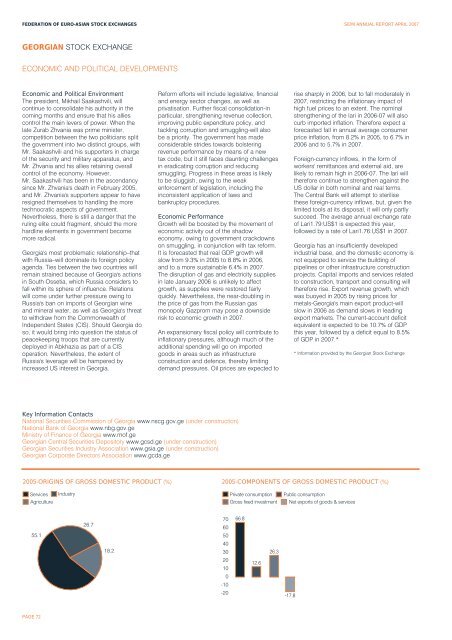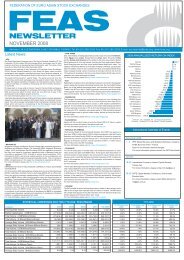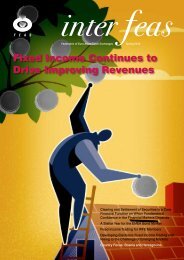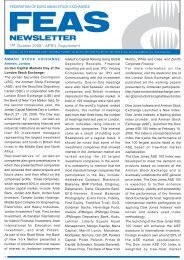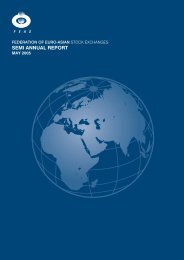Download - FEAS
Download - FEAS
Download - FEAS
Create successful ePaper yourself
Turn your PDF publications into a flip-book with our unique Google optimized e-Paper software.
FEDERATION OF EURO-ASIAN STOCK EXCHANGES SEMI ANNUAL REPORT APRIL 2007<br />
GEORGIAN STOCK EXCHANGE<br />
ECONOMIC AND POLITICAL DEVELOPMENTS<br />
Economic and Political Environment<br />
The president, Mikhail Saakashvili, will<br />
continue to consolidate his authority in the<br />
coming months and ensure that his allies<br />
control the main levers of power. When the<br />
late Zurab Zhvania was prime minister,<br />
competition between the two politicians split<br />
the government into two distinct groups, with<br />
Mr. Saakashvili and his supporters in charge<br />
of the security and military apparatus, and<br />
Mr. Zhvania and his allies retaining overall<br />
control of the economy. However,<br />
Mr. Saakashvili has been in the ascendancy<br />
since Mr. Zhvania's death in February 2005,<br />
and Mr. Zhvania's supporters appear to have<br />
resigned themselves to handling the more<br />
technocratic aspects of government.<br />
Nevertheless, there is still a danger that the<br />
ruling elite could fragment, should the more<br />
hardline elements in government become<br />
more radical.<br />
Georgia's most problematic relationship–that<br />
with Russia–will dominate its foreign policy<br />
agenda. Ties between the two countries will<br />
remain strained because of Georgia's actions<br />
in South Ossetia, which Russia considers to<br />
fall within its sphere of influence. Relations<br />
will come under further pressure owing to<br />
Russia's ban on imports of Georgian wine<br />
and mineral water, as well as Georgia's threat<br />
to withdraw from the Commonwealth of<br />
Independent States (CIS). Should Georgia do<br />
so, it would bring into question the status of<br />
peacekeeping troops that are currently<br />
deployed in Abkhazia as part of a CIS<br />
operation. Nevertheless, the extent of<br />
Russia's leverage will be hampered by<br />
increased US interest in Georgia.<br />
Reform efforts will include legislative, financial<br />
and energy sector changes, as well as<br />
privatisation. Further fiscal consolidation-in<br />
particular, strengthening revenue collection,<br />
improving public expenditure policy, and<br />
tackling corruption and smuggling-will also<br />
be a priority. The government has made<br />
considerable strides towards bolstering<br />
revenue performance by means of a new<br />
tax code, but it still faces daunting challenges<br />
in eradicating corruption and reducing<br />
smuggling. Progress in these areas is likely<br />
to be sluggish, owing to the weak<br />
enforcement of legislation, including the<br />
inconsistent application of laws and<br />
bankruptcy procedures.<br />
Economic Performance<br />
Growth will be boosted by the movement of<br />
economic activity out of the shadow<br />
economy, owing to government crackdowns<br />
on smuggling, in conjunction with tax reform.<br />
It is forecasted that real GDP growth will<br />
slow from 9.3% in 2005 to 8.8% in 2006,<br />
and to a more sustainable 6.4% in 2007.<br />
The disruption of gas and electricity supplies<br />
in late January 2006 is unlikely to affect<br />
growth, as supplies were restored fairly<br />
quickly. Nevertheless, the near-doubling in<br />
the price of gas from the Russian gas<br />
monopoly Gazprom may pose a downside<br />
risk to economic growth in 2007.<br />
An expansionary fiscal policy will contribute to<br />
inflationary pressures, although much of the<br />
additional spending will go on imported<br />
goods in areas such as infrastructure<br />
construction and defence, thereby limiting<br />
demand pressures. Oil prices are expected to<br />
rise sharply in 2006, but to fall moderately in<br />
2007, restricting the inflationary impact of<br />
high fuel prices to an extent. The nominal<br />
strengthening of the lari in 2006-07 will also<br />
curb imported inflation. Therefore expect a<br />
forecasted fall in annual average consumer<br />
price inflation, from 8.2% in 2005, to 6.7% in<br />
2006 and to 5.7% in 2007.<br />
Foreign-currency inflows, in the form of<br />
workers' remittances and external aid, are<br />
likely to remain high in 2006-07. The lari will<br />
therefore continue to strengthen against the<br />
US dollar in both nominal and real terms.<br />
The Central Bank will attempt to sterilise<br />
these foreign-currency inflows, but, given the<br />
limited tools at its disposal, it will only partly<br />
succeed. The average annual exchange rate<br />
of Lari1.79:US$1 is expected this year,<br />
followed by a rate of Lari1.76:US$1 in 2007.<br />
Georgia has an insufficiently developed<br />
industrial base, and the domestic economy is<br />
not equipped to service the building of<br />
pipelines or other infrastructure construction<br />
projects. Capital imports and services related<br />
to construction, transport and consulting will<br />
therefore rise. Export revenue growth, which<br />
was buoyed in 2005 by rising prices for<br />
metals-Georgia's main export product-will<br />
slow in 2006 as demand slows in leading<br />
export markets. The current-account deficit<br />
equivalent is expected to be 10.7% of GDP<br />
this year, followed by a deficit equal to 8.5%<br />
of GDP in 2007.*<br />
* Information provided by the Georgian Stock Exchange<br />
Key Information Contacts<br />
National Securities Commission of Georgia www.nscg.gov.ge (under construction)<br />
National Bank of Georgia www.nbg.gov.ge<br />
Ministry of Finance of Georgia www.mof.ge<br />
Georgian Central Securities Depository www.gcsd.ge (under construction)<br />
Georgian Securities Industry Association www.gsia.ge (under construction)<br />
Georgian Corporate Directors Association www.gcda.ge<br />
2005-ORIGINS OF GROSS DOMESTIC PRODUCT (%)<br />
2005-COMPONENTS OF GROSS DOMESTIC PRODUCT (%)<br />
Services<br />
Industry<br />
Private consumption<br />
Public consumption<br />
Agriculture<br />
Gross fixed investment<br />
Net exports of goods & services<br />
26.7<br />
70<br />
60<br />
66.8<br />
55.1<br />
50<br />
18.2<br />
40<br />
30<br />
26.3<br />
20<br />
10<br />
12.6<br />
0<br />
-10<br />
-20<br />
-17.8<br />
PAGE 72


